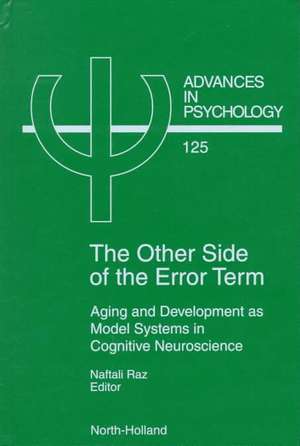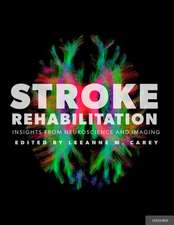The Other Side of the Error Term: Aging and Development as Model Systems in Cognitive Neuroscience: Advances in Psychology, cartea 125
Editat de N. Razen Limba Engleză Hardback – 22 apr 1998
Din seria Advances in Psychology
- 18%
 Preț: 950.00 lei
Preț: 950.00 lei - 18%
 Preț: 985.11 lei
Preț: 985.11 lei - 15%
 Preț: 457.35 lei
Preț: 457.35 lei - 23%
 Preț: 683.48 lei
Preț: 683.48 lei - 23%
 Preț: 675.31 lei
Preț: 675.31 lei - 23%
 Preț: 676.64 lei
Preț: 676.64 lei - 5%
 Preț: 839.37 lei
Preț: 839.37 lei - 5%
 Preț: 834.81 lei
Preț: 834.81 lei - 23%
 Preț: 668.19 lei
Preț: 668.19 lei - 34%
 Preț: 317.98 lei
Preț: 317.98 lei - 23%
 Preț: 674.72 lei
Preț: 674.72 lei - 20%
 Preț: 1422.35 lei
Preț: 1422.35 lei - 27%
 Preț: 737.53 lei
Preț: 737.53 lei - 20%
 Preț: 1519.06 lei
Preț: 1519.06 lei - 5%
 Preț: 1542.08 lei
Preț: 1542.08 lei - 27%
 Preț: 1020.01 lei
Preț: 1020.01 lei - 27%
 Preț: 1127.58 lei
Preț: 1127.58 lei - 27%
 Preț: 1330.32 lei
Preț: 1330.32 lei - 27%
 Preț: 998.93 lei
Preț: 998.93 lei - 27%
 Preț: 1300.14 lei
Preț: 1300.14 lei - 27%
 Preț: 1299.87 lei
Preț: 1299.87 lei - 27%
 Preț: 1076.26 lei
Preț: 1076.26 lei - 27%
 Preț: 1075.55 lei
Preț: 1075.55 lei - 27%
 Preț: 1078.09 lei
Preț: 1078.09 lei - 27%
 Preț: 1161.01 lei
Preț: 1161.01 lei - 27%
 Preț: 763.84 lei
Preț: 763.84 lei - 27%
 Preț: 908.62 lei
Preț: 908.62 lei - 27%
 Preț: 862.90 lei
Preț: 862.90 lei - 27%
 Preț: 770.45 lei
Preț: 770.45 lei - 5%
 Preț: 1010.86 lei
Preț: 1010.86 lei - 23%
 Preț: 713.55 lei
Preț: 713.55 lei - 23%
 Preț: 616.28 lei
Preț: 616.28 lei - 20%
 Preț: 691.31 lei
Preț: 691.31 lei - 23%
 Preț: 628.12 lei
Preț: 628.12 lei - 23%
 Preț: 653.33 lei
Preț: 653.33 lei - 27%
 Preț: 1382.65 lei
Preț: 1382.65 lei - 27%
 Preț: 1134.35 lei
Preț: 1134.35 lei - 23%
 Preț: 620.13 lei
Preț: 620.13 lei - 23%
 Preț: 651.55 lei
Preț: 651.55 lei - 23%
 Preț: 627.38 lei
Preț: 627.38 lei - 23%
 Preț: 616.73 lei
Preț: 616.73 lei - 27%
 Preț: 1051.14 lei
Preț: 1051.14 lei - 23%
 Preț: 627.09 lei
Preț: 627.09 lei - 27%
 Preț: 1198.73 lei
Preț: 1198.73 lei - 27%
 Preț: 1109.39 lei
Preț: 1109.39 lei - 27%
 Preț: 969.09 lei
Preț: 969.09 lei - 27%
 Preț: 1107.69 lei
Preț: 1107.69 lei - 5%
 Preț: 837.76 lei
Preț: 837.76 lei - 23%
 Preț: 621.30 lei
Preț: 621.30 lei
Preț: 1080.20 lei
Preț vechi: 1479.72 lei
-27% Nou
Puncte Express: 1620
Preț estimativ în valută:
206.72€ • 224.47$ • 173.65£
206.72€ • 224.47$ • 173.65£
Carte tipărită la comandă
Livrare economică 22 aprilie-06 mai
Preluare comenzi: 021 569.72.76
Specificații
ISBN-13: 9780444825223
ISBN-10: 0444825223
Pagini: 457
Ilustrații: 1
Dimensiuni: 156 x 234 x 27 mm
Greutate: 0.84 kg
Editura: ELSEVIER SCIENCE
Seria Advances in Psychology
ISBN-10: 0444825223
Pagini: 457
Ilustrații: 1
Dimensiuni: 156 x 234 x 27 mm
Greutate: 0.84 kg
Editura: ELSEVIER SCIENCE
Seria Advances in Psychology
Cuprins
Chapter headings: Introduction (N. Raz). Developmental Instability and Phenotypic Variation in Neural Organization (R.A. Yeo, S.W. Gangestad). Animal Models of Developmental Dyslexia: Lessons from Developmental and Cognitive Neuroscience (G.D. Rosen). Electrophysiological Correlates of Early Speech Perception and Language Development During Infancy and Early Childhood (D.L. Molfese). Developmental and Individual Differences in Short-term Memory (J.S. Saults, N. Cowan). Lifespan Studies of Mental Chronometry: Insights Derived from Chronopsychophysiology (T.R. Bashore et al.). Differential Contribution of Frontal and Medial Temporal Lobes to Memory: Evidence from Focal Lesions and Normal Aging (E.L. Glisky). Does Working Memory Work in Language Comprehension? Evidence from Behavioral Neuroscience (A. Wingfield et al.). Problem Solving, Inhibition, and Frontal Lobe Function (J. Dorfman).




